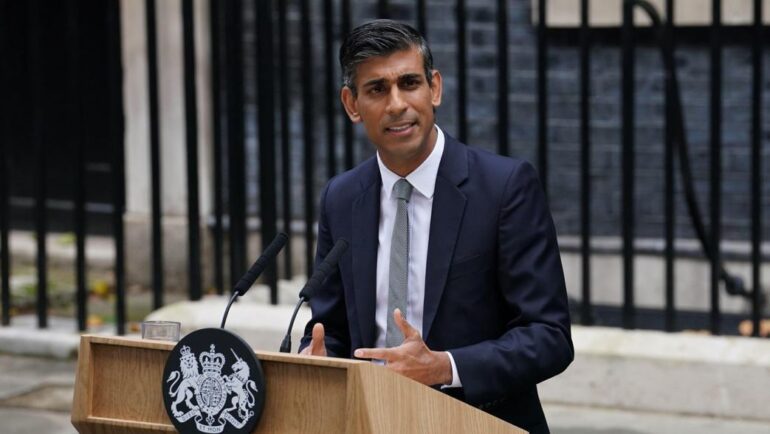TL;DR:
- Prime Minister Rishi Sunak announces the establishment of the world’s first AI Safety Institute in the United Kingdom.
- The institute will focus on evaluating and testing new AI technologies, addressing risks, and fostering safe and reliable AI development.
- The UK government’s Frontier AI task force, launched with £100 million in funding, aims to secure sovereign AI capabilities and leadership in science and technology by 2030.
- AI is officially classified as a national security threat in the UK, emphasizing the need for proactive measures.
- The AI Safety Institute will assess risks, from bias and misinformation to extreme scenarios, ensuring a shared understanding and international collaboration.
- Proposals include the creation of a global expert panel and cooperation with AI companies to lead in AI safety.
- Ian Hogarth, AI tsar and chair of the Frontier AI task force, warns of AI’s potential weaponization by cybercriminals against the National Health System.
- International collaboration is crucial in addressing global risks posed by advancing AI technology.
Main AI News:
In a landmark announcement, Prime Minister Rishi Sunak unveiled the United Kingdom’s groundbreaking initiative: the world’s inaugural AI Safety Institute. This institution is set to play a pivotal role in examining, evaluating, and rigorously testing the latest developments in artificial intelligence (AI). Sunak’s proclamation, delivered during an address at The Royal Society, underscores the global imperative to comprehend and mitigate the risks associated with AI, while fully harnessing its transformative potential for future generations.
The stage for this announcement was set just days before the UK hosts the prestigious Global AI Safety Summit at Bletchley Park, a hallowed ground of computer science. In April, Sunak introduced plans for the UK government’s Frontier AI task force, charged with spearheading the secure and dependable advancement of cutting-edge AI models. These models include generative AI large language models (LLMs) such as ChatGPT and Google Bard. Launched in June, the initiative is fortified with a substantial £100 million in funding, aimed at securing sovereign capabilities and fostering widespread adoption of secure and dependable foundational AI models. The overarching ambition is to position the UK as a preeminent science and technology powerhouse by the year 2030.
The significance of AI’s impact on national security was underscored in August when AI was officially classified as a national security threat in the UK for the first time. This determination followed the release of the National Risk Register (NRR) for 2023.
Prime Minister Sunak articulated the UK’s commitment to safeguarding its citizens: “The British people should have peace of mind that we’re developing the most advanced protections for AI of any country in the world. I will always be honest with you about the risks, and you can trust me to make the right long-term decisions.”
The AI Safety Institute will be entrusted with the crucial task of assessing and analyzing these multifaceted risks, ranging from societal challenges such as bias and misinformation to the most profound and far-reaching perils. Sunak emphasized the importance of comprehending the capabilities of each new AI model: “Right now, we don’t have a shared understanding of the risks that we face. Without that, we cannot hope to work together to address them.” To remedy this, the UK is steadfast in its commitment to fostering the first-ever international consensus on the nature of AI risks, ensuring that understanding evolves in tandem with the technology.
Prime Minister Sunak proposed the establishment of a global expert panel to publish a comprehensive “State of AI Science” report. Additionally, he highlighted the importance of collaboration with AI companies, who have already entrusted the UK with privileged access to their models, making the nation uniquely positioned to lead in AI safety.
Last month, Ian Hogarth, the UK government’s AI tsar and chair of the Frontier AI task force, sounded an alarm regarding the potential weaponization of AI by cybercriminals against the National Health System (NHS). Hogarth cautioned that AI could be deployed to disrupt the NHS, potentially causing disruptions on par with the COVID-19 pandemic or the WannaCry ransomware attack of 2017. He emphasized the risks associated with AI systems being used for cyberattacks on healthcare infrastructure or even the creation of pathogens and toxins. Advancements in AI technology, particularly in code generation, are progressively lowering barriers for cybercriminals to execute such attacks.
Hogarth asserted, “The government is quite rightly putting these threats at the very top of the agenda, but technology leaders need to heed the warning and get moving to better prepare for the next inevitable attack.”
Recognizing the fundamentally global nature of the risks posed by advancing AI technology, Hogarth stressed the importance of international collaboration on the broader spectrum of AI-related risks. He likened this collaboration to the UK’s cooperative efforts with China in areas of biosecurity and cybersecurity, highlighting the imperative of united action against these shared threats.
Conclusion:
The establishment of the AI Safety Institute by the UK signifies a pioneering step towards comprehensively addressing the risks and opportunities presented by AI. This initiative, backed by substantial funding and international collaboration, demonstrates the UK’s commitment to becoming a global leader in AI safety. It underscores the need for businesses to prioritize AI ethics, security, and collaboration in an increasingly interconnected and AI-driven market landscape.

